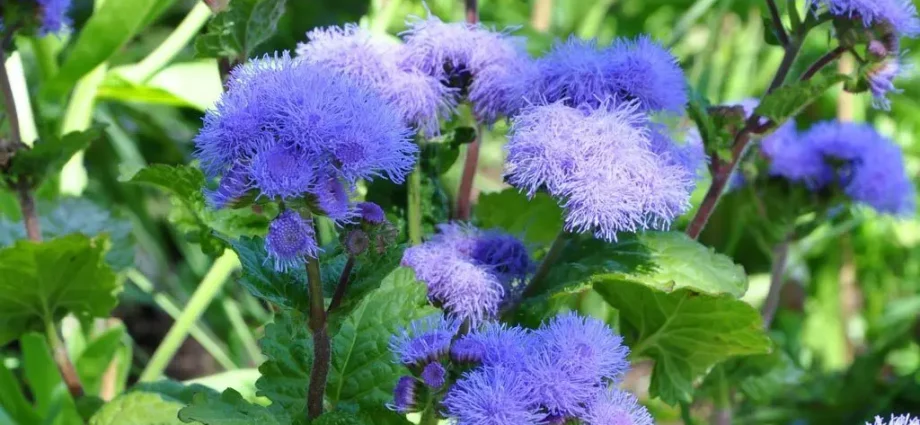Contents
Ageratum Blue mink is an ornamental herbaceous plant in the form of a low bush with pale blue flowers very similar to the color of the skin of a young mink. The shape of the flowers also resembles the fur of this animal with its soft petals-villi. The photo shows a typical representative of this ageratum variety. In our article, we will talk in detail about how to grow this flower from seeds.
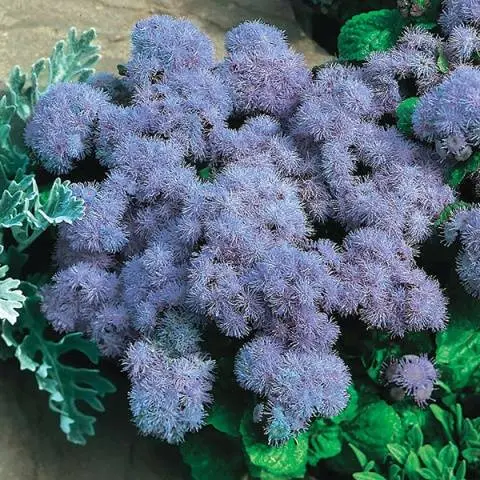
From seed to flower
The progenitors of ageratum come from southern countries, they love warmth and light, a moderately humid climate, they tolerate short periods of drought well and are very sensitive to soil composition. Heavy and loamy lands or shaded blown areas are not about them. You can get profusely flowering and healthy plants only by taking into account these nuances.
Description
The ageratum Blue mink belongs to the Aster family, it is cultivated in an annual form, the main indicators of varietal affiliation are:
- ageratum root – a strongly growing rhizome, superficial, occurrence in the ground no more than 20 cm;
- stems – erect, pubescent with sparse hairs;
- leaves – light green, oval, pressed with jagged edges, small near the inflorescence, closer to the root part – larger, grow densely;
- on the brushes of the ageratum, many peduncles are formed, collected in a bunch, similar to a fluffy ball;
- flowers – a lot of tubercles form on a flat core, from which thin petals of a delicate blue hue, fragrant, up to 3 cm in diameter grow;
- ageratum fruits – a seed box that contains many very small seeds;
- the height of the bushes varies from 30 to 70 cm, it depends on many conditions: the quality of seeds, weather conditions, compliance with agricultural technologies;
- flowering time – at the ageratum Blue mink they are very long, blooming of flowers begins 2 months after planting seedlings in the ground, and ends in October;
- Ageratum seeds are extremely small, sometimes it is difficult to sow them in containers or in open ground so that they are evenly distributed over the surface.
In the video at the end of the page, an experienced grower tells how this can be done in practice. Here you will also see all the stages of growing the Blue Mink agetarum from seeds.
Seed preparation
The annual plant ageratum Blue mink is grown only from seeds, they can be purchased commercially, there will be no complications with this. Difficulties may arise when sowing them, since ageratum seeds are microscopic.
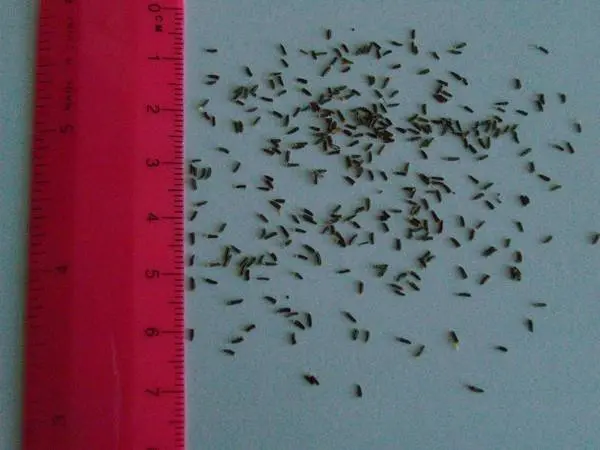
Flower growers sow the ageratum in two ways: with pre-soaking and further picking or dry seeds. Without soaking, that is, in the classical way, you need to sow them directly into a moist substrate.
Soaking small seeds will allow you to determine at the initial stage whether the seeds of the ageratum are suitable for subsequent planting in the ground. Poor quality, that is, unsprouted seeds, are removed after 3-7 days, they should not take up space in seedlings.
The substrate is ready
Ageratum Blue mink requires loose and light soil in its composition, this plant does not develop well on heavy soil, the roots get sick, flower ovaries do not form. The earth mixture is purchased in special stores for gardeners or prepared independently. The soil mixture should consist of the following components:
- Fertile land (chernozem or ordinary garden land) – 1 part.
- Large river sand or other baking powder (fine sawdust, ash) – 1 part.
- Leaf humus or high-moor peat – 1 part.
All components are thoroughly mixed and disinfected by thermal or chemical methods. The hot method is roasting the substrate in an oven or over a fire directly in the garden. The chemical method involves the treatment of the mixture with preparations designed specifically for these purposes. They are on sale, find out the instructions for use and dosage by reading the attached recommendations.
The substrate must be checked for soil acidity (this also applies to open ground), Ageratum Blue Mink prefers neutral or slightly alkaline substances. To determine the value of the acidity of the earth will help strips of paper with a litmus coating. These days, every gardener has these in stock, borrow from a neighbor or buy in a store.
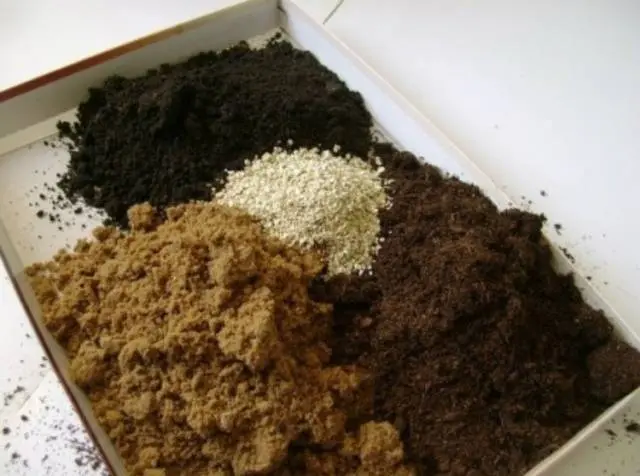
Sowing
Sow ageratum Blue mink begin in January or February. The vegetation of ageratums of all varieties is long, at least 100 days must pass from sowing to the first flowers, therefore, the earlier the seeds are sown, the sooner the flower ovaries form. Sowing technology is as follows:
- pour dry ageratum seeds into containers with prepared soil (necessarily wet), before that you can mix them with sand for ease of sowing, if the seeds are already germinated, carefully distribute them on the surface;
- sprinkle the entire surface with sown seeds with a thin (1 cm) layer of the same substrate, lightly press down with the palm of your hand;
- water moderately, trying not to budge the seeds;
- we cover the container with a paper towel to collect condensate, close it with a lid or glass on top;
- the container must be placed in a warm place, since the ageratums are thermophilic and start growing at a temperature not lower than + 25 ° C;
- within a week, the first sprouts of ageratum with cotyledon leaves should appear.
After 7-8 days, the first feeding of seedlings is carried out, combining it with watering. It is not recommended to feed the plant abundantly. To begin with, use a little powder to stimulate growth. Nitrogen fertilizers are not recommended at this stage of the ageratum vegetation.
Care of seedlings
Before the time comes for transplanting ageratum seedlings into open ground, greenhouses or greenhouses, it is necessary to carry out constant care for young shoots:
- regularly water with warm water heated to 25 degrees;
- maintain indoor air humidity and temperature;
- remove wilted leaves of ageratum;
- add lighting if the days are cloudy;
- feed ageratum 1-2 times a month;
- 2-3 weeks, and preferably a month, before planting ageratums in open ground, hardening is carried out: starting from 30 minutes and gradually increasing the time, containers with seedlings are taken out into the open air.
Compliance with the rules of care ensures that young ageratums will grow strong and healthy, ready for planting in the ground in a permanent place.
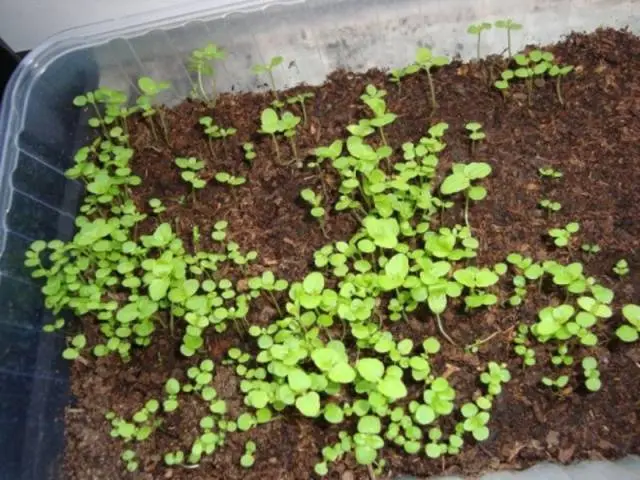
Landing in the ground
In the top photo, we see that not all seeds have grown evenly. Do not rush to draw conclusions and throw away weak plants, many of them will still gain strength and catch up with their relatives. If the time has come to transplant seedlings into the ground, proceed as follows:
- select the tallest and healthiest ageratum sprouts with 3-4 true leaves and plant them in the ground at a distance of 15-20 cm from each other (see video);
- leave small, stunted seedlings in a container, spill them with a solution that stimulates plant growth, and add a little nitrogen fertilizer;
- this method effectively affects most of the seedlings, the sprouts will actively start growing and quickly form new leaves;
- after 10 days, all ageratum seedlings will “migrate” to fresh air, very weak shoots can be transplanted into separate pots and grown as indoor flowers.
open areas
The site for planting the ageratum Blue mink should be well lit by the sun, not blown by frequent winds. On the leeward side, you can plant tall perennials that will perform a windproof function. The soil in flower beds and beds is preferred light and fertilized. Ageratums do not tolerate loamy and acidic soils. Ageratum seedlings are planted in May or June, the timing directly depends on climatic conditions.
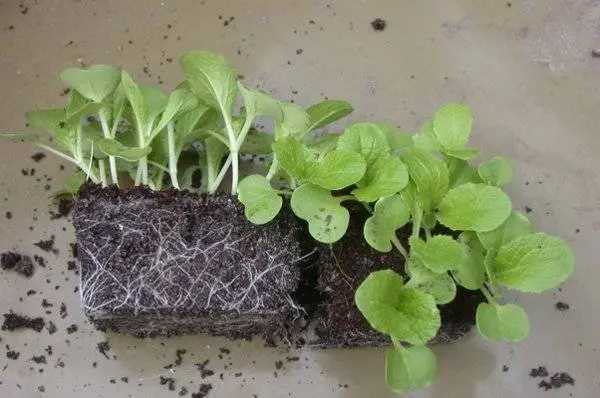
- Plants are carefully separated from each other, protecting the roots and leaves from breakage.
- Planted in shallow holes with a clod of earth at a distance of 25 cm.
- Water moderately.
The whole process is shown in more detail in the video posted at the end of the article. Watch it to the end and you will not regret the time spent.
Greenhouses
In closed heated greenhouses, only blue mink ageratum seedlings are grown mainly for sale. This happens in January-February. The conditions of the greenhouse allow you to get seedlings by the very beginning of the spring-summer season, when gardeners open a sowing campaign in their summer cottages. Seedlings of different varieties of ageratum are grown here, the most popular of them are: Blue Mink, White Ball, Pink Elephant and others. The sale of ready-made seedlings of ageratum frees flower growers from the work associated with growing seedlings. There are situations when flower lovers simply do not have the opportunity to do this: there is no place, no time, or there are any contraindications.
Care of seedlings
In care, our ageratum variety is unpretentious as it is demanding on soil and light, but gardeners should not leave this plant unattended. The most minimal care contributes to the successful development of culture, abundant flowering and the growth of bright green foliage. Ageratum bushes quickly and actively increase their green mass, closing the living space for the germination of weeds, so even weeding is not required.
Application in design
Ageratum Blue mink is used to decorate gardens, parks, city alleys. Its delicately colored flowers harmonize with many plants in flower arrangements. The compactness and short stature of the bushes allows the townspeople to grow it on their loggias and balconies. Landscape designers complement the design of picturesque flower beds with this small, delicate and fragrant plant.










